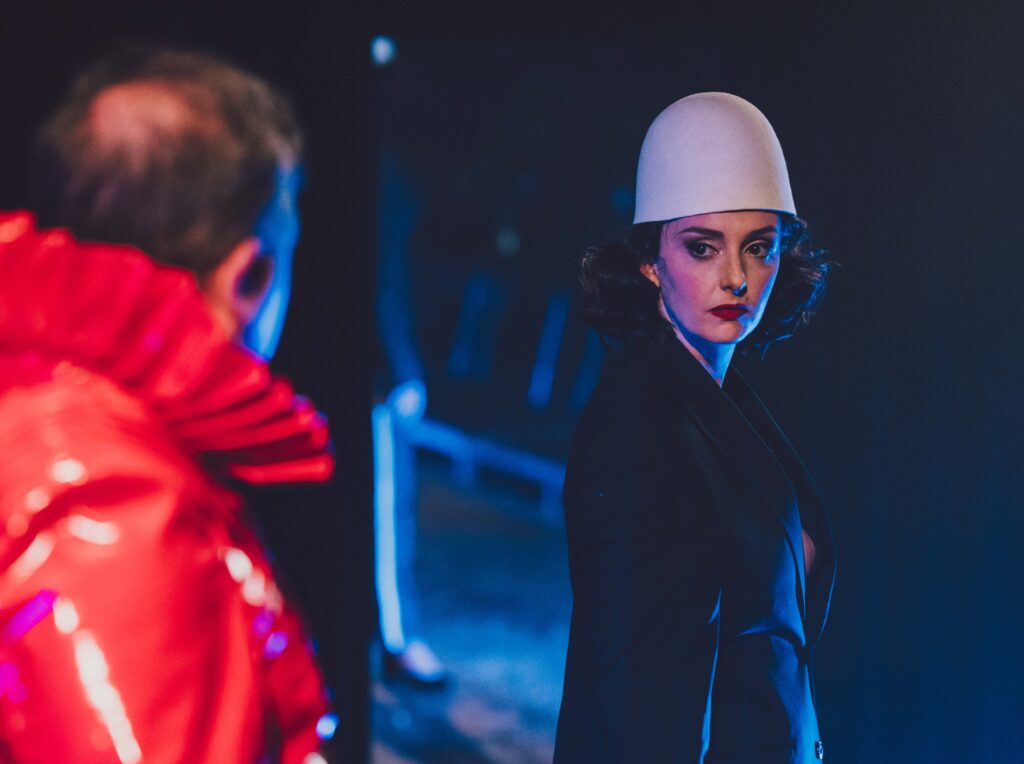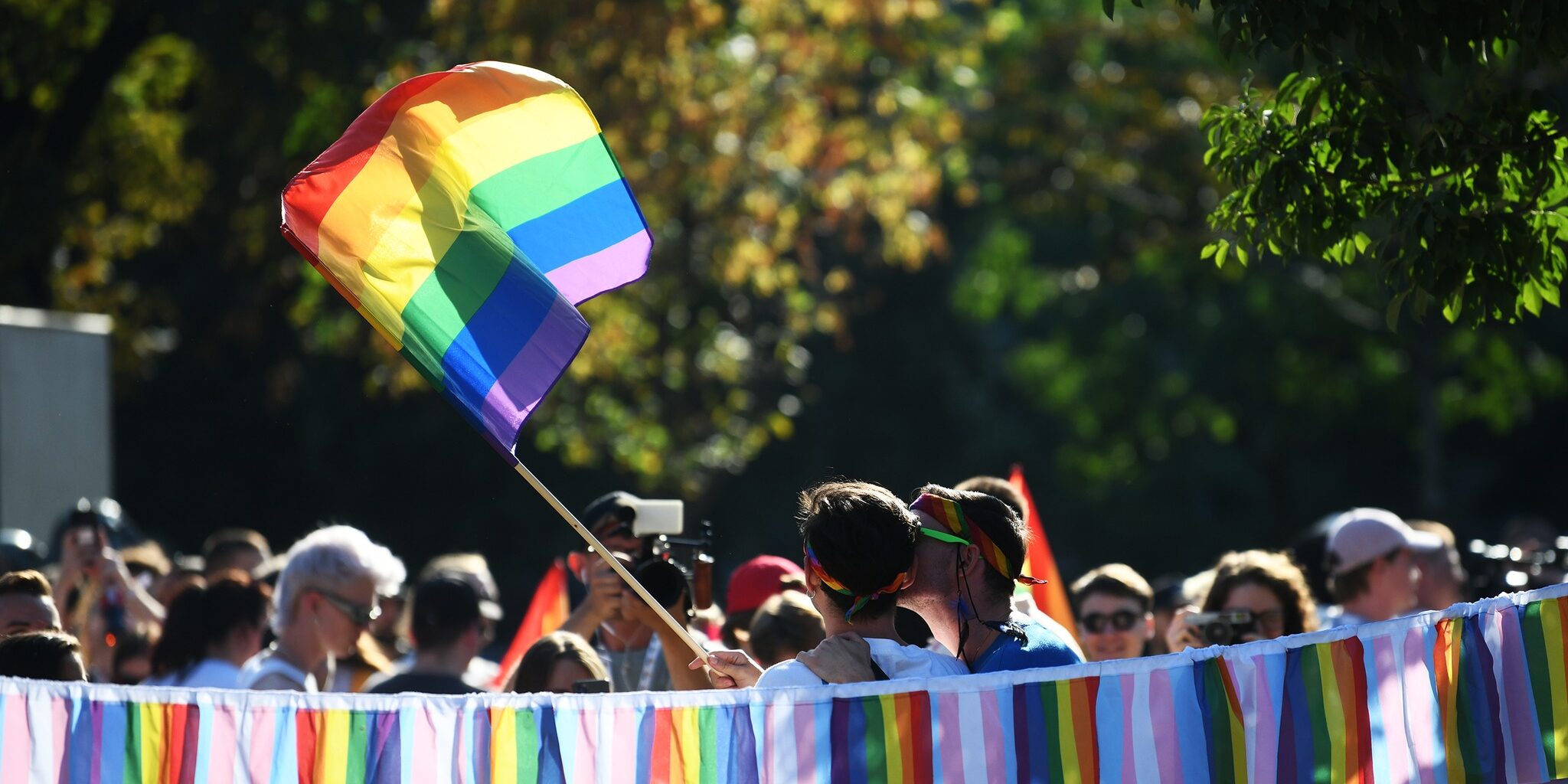The Belgrade Pride Theatre Festival takes place every year during Pride Week. Andrej Čanji reports on this year’s programme and two very different explorations of queer lives in the region.
Over the course of the two decades in which Pride has taken place in Belgrade, the struggle for equality has been met with violent resistance. The first Pride parade in 2001 ended with thugs severely beating 40 participants while police stood idly by. Fear prevented Pride from being organised again until 2009, when LGBTQ+ activists, emboldened by the passage of the anti-discrimination law, decided to try a second time. But the day before the parade, the Ministry of Home Affairs prevented them from going ahead by not granting them a permit for the event due to security reasons. There was not another parade until 2010. At that time, around 6000 police protected 1000 participants from the thugs who devastated Belgrade, causing over one million euros in damage and injuring 142 police officers. Since then, Pride has sometimes been allowed and it has sometimes been banned, under the pretext that it is not safe.
All of which is to say that conflict and tension are the inevitable companions of Pride in Serbia, but this year seemed to be an exception. There was a record number of participants. The usual arguments about whether Pride should take place or not were almost non-existent. As in previous years, the Pride march was accompanied by a week-long programme consisting of exhibitions, lectures, talks, workshops, films and theatre performances.
The independent multidisciplinary organisation Heartefact from Belgrade participated in the curation of this year’s Pride Week programme and initiated the creation of a new European theatre network that brings together theatres, groups and theatre organisations whose work deals with the perspectives of minorities and marginalised groups.
The first organisations to join were Scensverige – Swedish Performing Arts Coalition, Nomantinels from Slovakia, Wiener Wortstaetten from Austria and the Istrian National Theatre – Pula City Theatre from Croatia. The platform initiated in Belgrade is an important step towards a better representation of the queer community in Serbian and regional theatres.
This is not to say that such performances do not already exist in the region. The Pride Week theatre programme featured four productions dealing with gay and trans issues. The platform is just another step in queer artists’ efforts to make their experiences more visible to the general public. In addition to the two Heartartefact productions, Our Son and Before We Begin, the Pride Week programme also include two performances from Pula and Pristina.
(Mis)fit is the 2017 authorial project by actor Luka Mihovilović, created in collaboration with actress and director Gea Gojak and produced by the Istrian National Theatre. The monodrama is a coming-of-age story about a young gay boy, which explores different stages of his life: from pre-school to adulthood. Each scene explores different aspects of a young gay person’s experience within a homophobic environment and the impact this has on them. A teacher warns the boy’s mother that her son only hangs out with girls and doesn’t like sports. The concerned parents, and the wider environment, regard homosexuality as a disease. The play explores the trauma such messages have on the gay community through the sometimes-toxic communications on Grindr.
Alone on stage, supported only by lighting, sound and video effects, Mihovlilović conjures a constellation of characters with whom the protagonist comes into contact, while singing and dancing in an inspired way. He charmingly portrays the boy’s naivety and humorously depicts his parents’ worries, skilfully shifting from one character to another and demonstrating committed acting skills.
While the scenes are easy to identify with, representing typical situations of gay life in this region, the protagonist is so general that the play does not feel like a fictional biography of a specific individual, rather an instructive and critically constructed dramatization of a more general gay existence. The use of songs, vox pops and history lessons which present perceptions of gay life throughout history and famous gay figures from the past, amplify the activist aspect of the show. For this reason, (Mis)fit is a performance is likely to have a particularly positive impact on younger audiences.
While the Croatian play feels overly general, Sworn Virgin, based on the text by Jeton Neziraj, directed by Erson Zymberi and produced by Qendra multimedia, sometimes feels overly specific. The drama revolves around the figure of the burrnesha, a woman who, according to Albanian custom, is able to enjoy all the rights and duties of a man, with the only restriction that she has to be celibate.

Jeton Neziraj’s Sworn Virgin/Burrnesha
In Neziraj’s play, the burrnesha Sose (Tringa Hasani) becomes an object of academic interest for Edith (played by Semira Latifi), a London-based anthropologist. However, Julian (Kushtrim Qerimi), a failed drag performer, sees in Sose an opportunity to rekindle his artistic career. The play, which alternates between dialogue scenes and soliloquies, raises questions about tradition, gender and identity, while also exploring the exoticisation of folk customs and the Western appropriation of certain cultural phenomena.
Edith seems keen to impose Western notions of gender and transgender identity on Sose, while Sose performs traditional patriarchal ideology. Julian hires Sose to appear on stage and tell their story, only to provide them with a sensational text which in no way describes the burrnesha existence.
Neziraj’s text problematises the West’s colonial relationship to other cultures. Julian asks Edith to bring Sose to London as if they were an exotic animal. Sose says several times that they feel like an exhibit in a zoo. At the same time, Neziraj interrogates the phenomenon of the burrnesha. For example, at one point, Sose says that being a burrnesha offers the infinite freedom that only men possess. They talk about how throwing a mirror out of the house for fear of not looking too feminine. They discuss how menstruation is a huge psychological challenge for them.
Zymberi’s production does not employ much scenery, though for reasons that are not entirely comprehensible, an empty bathtub is used in some scenes. The main focus is on the performances, which are furious and fierce from the off. There is very little tonal variation, everything is performed in a similar register, and the production suffers from this. This almost constant tension, especially when it comes to the character of Sose, prevents the production from developing emotional nuances and different shades of meaning.
While Sworn Virgin criticises the West’s attitude towards other cultures, it also addresses the patriarchal customs that created the burrnesha in the first place. Neziraj is equally critical of London, where, as the play says, everyone lies to make money, and folk cultures in which women are repressed. This plot is not dramaturgically resolved, however, but simply interrupted by the scene in which the burrnesha returns from London to their house. When Julian arrives, seemingly repentant, Sose invites him into their home. Now it is Julian who is seen by the locals as an exotic animal. The roles are simply reversed, suggesting that understanding between different cultures is impossible because each tries to measure the other by their own standards.
The conflict between tradition and modernity is an extremely complicated matter and bridging these differences is not possible overnight. The history of Pride in Serbia is proof that change comes slowly and moves along a path full of obstacles. To reconcile the conventional with diversity, one has to make great, persistent and painstaking efforts. Some theatre professionals from Belgrade have understood this and have already taken up this task by organising these guest performances and announcing a European theatre network, which will make an important contribution to this agency and should therefore be welcomed.
For further information, visit: Heartefact.org
Further reading: review of Burrnesha/Sworn Virgin
Andrej Čanji is a theatre critic and theatrologist based in Belgrade.








